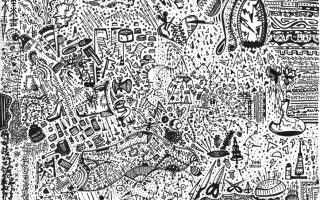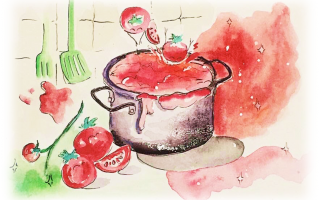by EDVIGE GIUNTA
November 1991. I don’t look at the telephone though my hand rests on the receiver. Sitting cross-legged on the floor of the living room, I stay still, eyes fixed on the irregular pattern on the rug worn by time. Although the thick gray light filtering through the windows evokes the end of the day, it cannot be later than four o’clock. Surely, I must be mindful of the six-hour difference between Italy and the United States.
Only three months have passed since I moved from Long Island to Schenectady. Yet, I feel more settled than I have since I arrived in the United States seven years ago. I’ve never lived in a place like this post-industrial American town. There’s something old, sad, and familiar about Schenectady. Here the past is a fine coat of dust that eludes the eye, but its particles float in the very air you breathe. When sunlight invades the rooms, the corpuscles’ physicality surprises you. They are everywhere. You ask yourself, “How could I not see it before?”
The name Schenectady comes from skahnéhtati. It means “beyond the pines.” This is a land of invasions and colonizations. Once it was Mohawk land. Then the Dutch settlers came. Many street names still have the prefix “Van.” In the nineteenth century the town became a bustling manufacturing center. Immigrants from Europe flocked there, including Italians.
Schenectady is a town folded in a dream. Dilapidated mansions, some of which serve as student housing, cling to memories of other times. When you’re not paying attention, the houses whisper secrets. What? What did you say? Too late. The houses go quiet.
It’s early summer when I come to look for a place to live. A colleague shows me a mansion owned by the college where I will be teaching. Grand, ornate stairs with broken steps rise from a once magnificent salon with creaking floors and faded wall paint, high ceilings traced by serpentine cracks, mutilated chandeliers. The smell of mold, of decay, of lost things and long-gone people, wraps itself around me. Mesmerized, I wander through rooms where muted echoes of music from debutante balls hang in the thick, stale air. I envision myself living in this house. The salon fills with the chatter of friends I have not yet made. A painted Sicilian ceramic bowl filled with pasta alla puttanesca sits on an invisible table. Soundless Italian music plays in the background. My faceless guests and I drink red Corvo from empty glasses. And when they leave, I retire to my room as the house falls back into silence and the embrace of ghosts.
While my husband chats with my colleague, I wander upstairs. In a dark kitchen, I stand in front of a rusted stove, surely useless. I look at it with affection, as if recognizing someone I once knew but had forgotten. In this forlorn room, the voices from downstairs resound distant and muffled. Rent is only $500 a month, the same or less than what I would have to pay for a plain two- or three-bedroom apartment in a two-family house. I could live here. I could.
In the end, I abandon the stove, the kitchen, the salon, the cracked walls, the creaking floors, the beaten-up staircase, and the invisible guests, to their destiny. I can’t. I can’t live alone in this house. And so, the search resumes, until I find a more reasonable accommodation, an apartment on the second floor of a house in a modest middle-class neighborhood. Plenty of space: three bedrooms, medium-sized living room and dining room, a porch, and a tiny office. Yet I don’t forget the mansion. I long for it, regret not choosing it. To new and old friends, I tell the story of visiting it, how it almost became my home. Now and then, I drive around the college looking for it, but never find it.
Schenectady is a huge change from Miami, where I spent the first six years of my life in the United States. Miami was its own dreamland. The never-ending summer obliterates the cycle of seasons to which I had been accustomed. Amidst palm trees and surreal sunsets, I had slowly divorced myself from my Sicily, from my past, from Sonia.
In Miami, I make a new life, reinvent myself through a new language. I marry a fellow graduate student. We have a daughter. We get PhDs. Then, we move to Long Island. Southampton, a town forsaken by its summer citizens during the freezing winter. My husband has a full-time job and is well-liked at the college. There’s the promise of green cards for both of us. I could settle into the simple, peaceful rhythms of domestic life. But I am a woman on the run.
When we move to Southampton, a few months after I finish my dissertation, I lack the experience and self-discipline to use the time away from teaching to devote myself to research and writing. I am marooned in the emptiness of unstructured days.
Reading and writing fade from my life, though every morning I still sit at the dining room table, sifting reluctantly through the typescript of my dissertation. The words on the page merge into each other, their meaning cryptic, slippery. My days unfold in the reassuring grip of the domestic chores in which I find refuge, welcoming their monotony, their fleeting results.
I vacuum the floors twice a day. Dust. Cook. Fill the dishwasher. Empty it. Do laundry. Iron. Organize cabinets, closets, drawers, following a rigorous cycle to establish an order that thankfully comes undone and soon requires my intervention, my supreme organizing and reorganizing. I am Penelope. I am Sisyphus. I am Tantalus. The spotless rooms don’t disclose my inner chaos to occasional visitors, old friends from Miami and Sicily who have moved to New York. These weekend gatherings, too, offer temporary relief. We cook Italian food and stay up late, drinking wine, laughing, sometimes breaking into song.
At night, I lie awake in bed, alert to the whispers of the silent house. Sometimes I can’t bear staying in bed. I tiptoe to the darkened living room. Is somebody sitting in the sofa, looking at me?
I go into the bathroom. The light stays off. For hours, I sit on the floor, leaning against the wall, finding comfort in the cold touch of the tiles and the wind howling against the windowpanes. I swallow the sounds of the night—the lamentations of an old house amplified by the eerie silence.
In front of the mirror above the pink porcelain sink, struggle to recognize the stranger’s face reflected on the silvery surface. The mouth in the face in the mirror opens. Who’s behind me?
The despair that strangles me seems to have no reason, no origin. A relentless, inexplicable sadness has been spreading, thick like good olive oil. In Miami, I had caught glimpses of this creeping sadness. It had stopped me in my tracks, surprising me and my befuddled husband as it blurted out of me in short-lived outbursts. Now it claims me boldly, and I surrender.
My daughter, my beautiful daughter, a chubby toddler with a cheerful personality, keeps hope alive, makes me smile during these hard times. On warm days, I push the stroller through our empty street, and we head towards Main Street, the town’s center, with its fashionable boutique stores and cafés.
I sit on a bench while my little girl runs around. She squeals with joy and surprise, points to a dog, a honking car. Following her every move, I nod and smile, pick her up and kiss her soft round cheeks, the layers of baby fat in her neck, her small, quick hands. When I tickle her, she laughs a belly laugh and wraps her chubby arms around my neck. She’s so soft, so sweet, so pure.
When she gets tired, I strap her in the stroller. We head home, to that home filled with other people’s furniture and memories I unwittingly avoid. On the way back, we stop by the health food store. One hand on the stroller’s handle, I spin the spice rack, pick small jars of organic oregano, rosemary, and cinnamon—the aromas of my island.
A dormant will to live stirs in me now and then. It propels me to search for a way out of this stupor, away from this alien place. Books beckon me and I return to reading—Sandra Mortola Gilbert’s memoir, Wrongful Death, a story of the relentless rhythms of grief, how we fight it, how we must open ourselves to its flow. I have no idea that a few months from now I will sit on the floor of an old house in Daisy Miller’s hometown, ready to make a phone call.
I don’t think of Sonia. Ever. Or at least I don’t remember thinking of her. I don’t remember wondering where she is, how she is, whether she is asking herself why I haven’t called or written for over two years.
And then in late spring, I receive two job offers: a visiting position at a wealthy liberal arts college in Schenectady and a tenure-track job at a community college on Long Island. My mentor reminds me that the job in Schenectady will give me time for research and writing that the nine-course per year teaching load at the community college would not permit. And so, I say no to the Long Island job. I’m thinking of the future. But there’s more, though for now it remains unspoken. The town inhabited by ghosts is calling me.
It will be complicated, but my husband and I work out a plan. My daughter will stay with him in a nine-month rental in the Hamptons until Thanksgiving, when the nursery school at the college in Schenectady will have a spot for her. This temporary separation is the hardest thing —my daughter is only two and a half. But she and my husband will come every Thursday evening and stay with me until Sunday afternoon. And it’s just for a couple of months, I tell myself. In May, when school ends, my husband will leave the Hamptons and move to Schenectady.
I love being back in the classroom, teaching James Joyce and Sylvia Plath. The paralyzing sadness that afflicted me in Southampton begins to lift. The new solitude feels strangely tolerable, though I miss my daughter terribly.
I start writing again, not about Joyce, the subject of my dissertation, but Italian American women. I am drawn to these writers with whom I share a sense of having betrayed but also having been betrayed by our country, and a longing, sometimes quiet, sometimes tumultuous, for something we have irrevocably lost.
My hand sweats as I press it on the receiver. What brings me to this moment? A memory? A photo? Sifting through old papers and letters? Eating egg salad? Cutting my finger while slicing carrots? A whisper of the house? All I know is that I start dialing 011 39 051….
I feel like I do in a recurring dream in which I am desperate to call someone—I don’t know whom—and must use one of those old-fashioned black rotary telephones, like the one we had when I was a child back in Sicily. In the dream, dialing the full number is impossible. My fingers are numb. They tremble and cannot push the rotary dial the whole way around. Every time, I lose my grasp and the dial slips back, forcing me to redial and fail again and again, repeating a mysterious number in my head. Full of dread, I forget, remember, then forget all over again.
The phone I use today is a touchtone, but pushing the numbers requires all my attention. I hold the receiver in one hand, quivering, engulfed by waves of nausea. My mouth is dry. I lick my lips, straighten myself in anticipation.
My gaze turns to the pattern on the faded blue rug as if seeking reassurance, while the receiver presses hard against my ear.
The phone rings at the other end, the Italian tone, slow, once familiar and now so foreign, so remote.
Pronto? A man’s voice says.
I take a deep breath.
Maybe it’s your boyfriend. The last one.
My mouth moves, makes sounds. I hear myself speak as if my voice is coming from a very distant place. I say “Pronto.” I say that I am your friend, that I am calling to ask about you. Notizie di Sonia. This is what I say. Chiamo per avere notizie di Sonia. I do not ask to speak to you. I do not ask how you are doing. I know better. How could I not?
I must have known that summer of
three years ago, when I didn’t visit you in Bologna, when I didn’t call you to tell you I wasn’t coming. I must have known when I didn’t write.
A long silence at the other end. Then the male voice that comes from three thousand miles away lowers. The tone is almost apologetic when the voice finally says—
Sonia died three years ago.
The voice is kind.
I’m sorry….
His words hang heavy between us, these two strangers who loved you, Sonia, half-Sicilian, half-Swiss, artist, daughter, sister, aunt, lover, friend.
I don’t remember what I say or how much longer I stay on the phone. What is there to say to this man who was by the side of the girl I loved forever and who loved me so, the girl from whom I walked away when she was dying?
Maybe I say thank you or goodbye or some other perfunctory words. My hand lowers to return the receiver to the phone as if attaching the last piece of a fragile archeological artifact. I must put down this object ever so carefully, holding my breath, as if this were the most vital, the last meaningful act left for me to complete in this life.
I do that.
I put it down.
This moment, this singular moment when time rushes through me with all the decisions and indecisions that have led me to make this belated phone call–this moment will not stop. It’s hungry and fierce. It wants me. It keeps growing, seeping through tendons, muscles, bones, looking for a point of entrance into the blood flow–until it finds one.
And then my body crumbles. Incoherent. A mess. Limbs and organs spread on this faded blue rug in this room in this foreign town where I begin to remember, where the truth I have buried for three years has finally erupted.
And what my throat pushes out of my mouth is not crying. There are no sobs, no tears, no recognizable sounds of grief. This is some other primitive sound.
The words spill out. Incandescent. Searing now. I hear them. I hear these words, I see them. Touch them. They are all over me.
And she is dead. Sonia.
On the cover: illustration by BARBARA DI BERNARDO
* Edvige Giunta thanks Valentina Di Cesare, Emanuele Pettener, Ilaria Serra and Michela Valmori for the vital creative space they have created for Italian American women writers, including those who, just as she did, became Italian American in their adult lives. Giunta is grateful for the translation of “The Telephone Call”, an excerpt from her manuscript “No Confetti for the Dead”. She would also like to thank Cettina Morreale for her valuable contribution.




